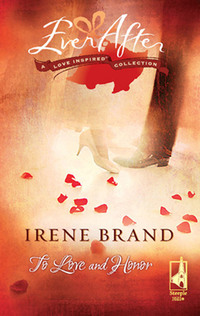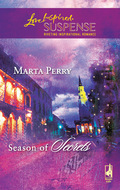Raamatut ei saa failina alla laadida, kuid seda saab lugeda meie rakenduses või veebis.
Loe raamatut: «To Love and Honor»
“Roger, why haven’t you ever remarried?”
Violet asked as she gazed into the fire.
“Are you proposing to me?” A mischievous twinkle sparkled in his dark eyes.
“Of course not,” she said. “I’m just…curious. Don’t you miss sharing your life with someone?”
“At first the pain was too deep to even consider it. But lately, I have been thinking about marrying again,” he admitted.
Roger stood and stoked the fire. “Now it’s my turn to ask questions—are you going to marry Larry Holland?”
His question startled her, but she smiled. “He hasn’t asked me.”
“But if he does, will you marry him?” Roger continued to look at her, his gaze intense.
Violet looked away. She stared into the flames.
“I’ve often asked myself the same question. Right now, I honestly don’t know….”
IRENE BRAND
Writing has been a lifelong interest of this author, who says that she started her first novel when she was eleven years old and hasn’t finished it yet. However, since 1984 she’s published thirty-two contemporary and historical novels and three nonfiction titles. She started writing professionally in 1977 after she completed her master’s degree in history at Marshall University. Irene taught in secondary public schools for twenty-three years, but retired in 1989 to devote herself to writing.
Consistent involvement in the activities of her local church has been a source of inspiration for Irene’s work. Traveling with her husband, Rod, to all fifty states, and to thirty-two foreign countries has also inspired her writing. Irene is grateful to the many readers who have written to say that her inspiring stories and compelling portrayals of characters with strong faith have made a positive impression on their lives.
To Love and Honor
Irene Brand

MILLS & BOON
Before you start reading, why not sign up?
Thank you for downloading this Mills & Boon book. If you want to hear about exclusive discounts, special offers and competitions, sign up to our email newsletter today!
Or simply visit
Mills & Boon emails are completely free to receive and you can unsubscribe at any time via the link in any email we send you.
For I was hungry and You gave me something to eat, I was thirsty and You gave me something to drink, I was a stranger and You invited me in, I needed clothes and You clothed me, I was sick and You looked after me, I was in prison and You came to visit me.
—Matthew 25:35–36
Dear Reader,
Frequently I’m asked, “How long does it take you to write a book?” That’s a difficult question to answer, for the time needed to write a book varies with each story.
Probably the best answer would be, “It takes a lifetime to write a book,” for whatever a writer produces, either fiction or nonfiction, is a composite of the author’s life up to that point. While I have never considered any of my writing as autobiographical, I do rely heavily upon information I’ve accumulated during years of varied experiences. The ideas for most of my historicals germinated when I was studying and researching for my master’s degree in history, or when I was teaching the subject to ninth graders. I was inspired to write my books on early church history while touring Switzerland, Germany and Holland in 1992.
And my interest in writing for the inspirational market has been a result of my religious training from early childhood. Prayer, Bible study and church involvement have been my normal routine for most of my life. Although I’ve experimented with secular writing, I’ve had little success, perhaps because God was directing me toward a more fulfilling ministry—inspirational fiction.
It’s still an awesome experience when I see a new book in print. I often express my gratitude in the words of David: “Who am I, O Sovereign Lord, and what is my family, that you have brought me this far?” (II Samuel 7:18)
I pray that you will be uplifted spiritually by reading this book. May God bless you.

Contents
Chapter One
Chapter Two
Chapter Three
Chapter Four
Chapter Five
Chapter Six
Chapter Seven
Chapter Eight
Chapter Nine
Chapter Ten
Chapter Eleven
Chapter Twelve
Chapter One
As the closing school bell rang, Violet Conley dropped into her teacher’s chair with a deep sigh. Would she ever sponsor another Social Studies Fair? She closed her eyes for a few minutes, and then opened them slowly. Did the room really look as bad as she had thought?
Afraid so! Violet conceded grimly, as she pushed herself upward. She had permitted the students to work too late in their frenzy to be ready by the weekend, and they hadn’t had time to clean up the classroom before catching their buses. All of them were gone except Janie Skeen, who was shelving books. Janie lived two blocks from the school, so she often stayed behind to help Violet. The girl’s slender body already exhibited lovely curves and grace, and except for the melancholy look in her deep brown, long-lashed eyes, she would have been beautiful.
Violet was pleased to have Janie’s help, for the whole room was in disarray, due to the past several days of research. While valuable to the pupils, it had been hard on a teacher’s nerves.
“You’re probably glad that tomorrow is the last day to work on projects,” Janie said with a slight smile.
“Right now, that’s true,” Violet agreed as she carried the waste bin from desk to desk picking up litter.
“But when the projects are all arranged, and I see the culminated effort of our whole school, I forget about the frustration and hard work.” She shook her head in exasperation as she picked up a book that a student had left behind, for it was a book on the rules of football, which he undoubtedly was reading when he should have been working on his class assignment. She locked the book in her desk. She would discover, and admonish, the culprit when he came looking for his book.
“You say your project is coming along well?”
“Yes, I think so,” Janie said timidly, “but I don’t suppose I’ll be a winner.”
“You’ll have as much chance as anyone.” When Janie still looked skeptical, Violet added, “The judges are from out of town, so names won’t mean anything to them.”
No need to pretend that she didn’t know the reason behind Janie’s skepticism. Janie had enrolled in Maitland High at the beginning of the school year, but she hadn’t been accepted by her peers. The teachers liked Janie, because she was well behaved and eager to learn, but most of the students ignored her…some because they feared her, others considered she was inferior to themselves, while the majority of pupils didn’t know how to befriend a runaway girl who had lived on the streets of Chicago for six months, before she was placed in a foster home in Maitland, their small town in southern Illinois.
Moving into the computer room, Violet found it in better shape than the classroom. The students had found the Internet indispensable in researching their projects, and Violet was happy that the principal, Larry Holland, had secured a federal grant to provide the equipment. Violet sat at one computer and typed in a password to check her E-mail. “Receiving one message of one,” she read, hoping that the communication wouldn’t require any further work on her part today.
“Don’t forget our date. I’ll pick you up at six. Larry”
The day’s frustrations were forgotten and, with a broad smile on her face, Violet clicked the icon, Return to Author, and typed in “OK.” On days when Violet didn’t have occasion to speak privately with Larry, he often contacted her on the Internet.
Although the classroom was orderly at last, Janie loitered. “Thank you, Janie,” Violet said with a warm smile. “You’ve been a big help, but you should go now. I’ll need to leave in a few minutes.”
Janie picked up her books and, with a wave of her hand, walked out into the hall, passing Nan Oliver in the doorway.
“I wish I could give that girl a big hug every day,” Violet said, as her friend and fellow teacher sat at a student’s desk that was much too small for her plump frame.
“I know what you mean. The girl is starved for love. I hate these new rules that forbid us to touch any of our students.”
“I wonder if her foster mother is good to her.”
“As far as I know, Margaret Grady is a good and caring person, but she’s mothering three foster children, and since Janie is the oldest, she probably doesn’t get much attention. I’m sure she has enough food, and her clothes are adequate, but she has such a lonely look in her eyes.”
“She stirs my sympathy and a desire to mother her,” Violet commented.
“I suppose we can never understand what it’s like to grow up with a troubled childhood,” Nan said.
“When I remember how secure I felt at home, I can’t comprehend what life has been for Janie and others like her. Can you?”
Violet lowered her eyes. Although Nan was her closest friend on the staff, there were some details about her past that she couldn’t disclose even to her. Fortunately, she didn’t have to answer because the all-clear buzzer sounded, indicating that the students were gone and teachers could leave the building. Nan heaved herself out of the chair.
“I’d better run,” Violet said. “Larry is picking me up at six o’clock, and I have lots of things to do before then.”
She locked her classroom door and walked down the hall at Nan’s side.
“Heavy date, huh?”
“It’s his mother’s sixty-fifth birthday, and we’re going to Saint Louis to celebrate. Many of her relatives live in Saint Louis, and they’ve reserved a private room in an exclusive restaurant.”
“Must be nice to travel with the upper crust!” Nan said, her smile taking the sting from her words.
“Oh, I don’t know,” Violet said, lowering her voice. “Why does she approve of me, when she’s chased away the other women he’s dated?”
“If you don’t mind my saying so, it isn’t any credit to you. She’s probably decided that you aren’t any threat to her, that if Larry marries you, she can still control his life. If you do anything to cross her, she’ll boot you out the door in a hurry.”
“In other words, you’re suggesting that I’m wishy-washy,” Violet accused with uplifted brows.
“Those are your words, not mine,” Nan replied, and her round face exploded into laughter. Seriously, she added, “I hate to see you mixed up with that family.”
“Well, I may just dare to disagree with one of Olivia Holland’s opinions tonight. That will give her a reason to remember her sixty-fifth birthday. Would that suit you?”
“If you do, I may need to come to Saint Louis to bring you home, but don’t expect to reach me until after the soccer game. I’m driving my boys and other team members tonight.”
A ten-minute drive brought Violet to her home. She entered the house with a sigh of pleasure. Since she had bought this house a year ago, it had been a sanctuary. The four-room dwelling, a bungalow so typical of the Midwest fifty years ago, had been a bargain. Violet had spent a lot of time working on the house, painting, papering and even making window curtains.
A serving bar separated the small, convenient kitchen from the dining space. She ate her meals at the bar, and she didn’t entertain much, so the dining room served as an office, where she used a computer to write her lesson plans.
Her bedroom was large, and a bathroom separated it from the smaller bedroom, which was only big enough for a single bed. This was Aunt Ruth’s room during her occasional visits to Maitland.
The living room was cozy. Bookshelves lined one wall and several easy chairs and a comfortable couch faced the television. Ruffled curtains graced the double windows that opened on the porch. A bookcase housed Violet’s collection of ceramic dolls that she had been gathering since childhood. Several landscape prints hung on the cream-colored papered walls, and a multicolored carpet covered the floor. A fireplace, housing a gas stove, provided extra warmth to the house on those days when she didn’t need the furnace.
After Violet went out on the porch for her mail, she decided that she had a few minutes to relax before she dressed for the evening, so she settled into the lounge chair in the living room and put her feet up.
She laid aside the two bills, pitched the junk mail into the small waste can beside her chair, and opened Aunt Ruth’s letter. The note was brief, as they always were, but receiving them weekly made a big difference in Violet’s life. She had always struggled with the need to establish an identity, and that was one reason she was so sympathetic to the plight of Janie Skeen. Aunt Ruth and her husband had given Violet a home from the time she was two years old, but that wasn’t the same as living with one’s parents. Violet had fought all her life to overcome a feeling of inadequacy, so she understood Janie’s situation completely. Aunt Ruth lived alone since her husband’s death five years ago, but her notes were always upbeat as she wrote about her part-time job, the neighborhood children and her church activities.
Not least among the debts that Violet owed to Aunt Ruth was the blessing of living in a Christian home. Church attendance had been a part of Violet’s upbringing, instilling a dependence upon God in her that had often been the only consolation she had during her maturing years.
Reluctantly, Violet left the cozy chair and went to the bedroom to dress for the evening. She was flattered that Larry Holland, Maitland’s most eligible bachelor, had singled her out for his attention, but still she dreaded this evening. When she was alone with Larry, Violet was content, but she was always uncomfortable in Olivia Holland’s company. The Hollands were rich and very influential in the state, and Mrs. Holland never let one forget the fact. Her own family had impeccable lineage, or so she insisted, and she didn’t let anyone forget that, either. When they first started dating, Violet had expected Mrs. Holland to check her ancestry, but apparently she hadn’t, for Violet was convinced that if the aristocratic Olivia Holland had even looked into Violet’s family background, she would have heard about it.
Larry wasn’t like his mother, else Violet wouldn’t have given him a second glance, although he had subtly suggested a few times that Violet should buy more expensive clothes, a hint she had ignored. By the time she made payments on her house and car, she didn’t have enough money to buy designer clothing.
So, what was she going to wear tonight? She soon decided on a navy, ankle-length silk skirt and long-sleeved lace blouse that matched her violet eyes—a striking feature that had resulted in her name.
Violet showered quickly, wearing a cap over her head, because she didn’t have time for a shampoo and styling. Fortunately, Violet’s naturally curly hair was easily managed. She visited the hairdresser to have it cut and shaped every two months, but the rest of the time a few strokes with a brush left her short hair in black soft curls all over her head.
She applied makeup sparingly. Her fine features and smooth skin, rich and deep in texture, needed little enhancement. She left off eye makeup completely, because her violet eyes fringed by long, up-curling black lashes were naturally distinctive. Violet was above average height and well proportioned. With her graceful form, even inexpensive garments set well on her.
She knew that Larry would arrive promptly at six o’clock, so she was surprised when the doorbell rang twenty minutes before that. She pulled a lightweight evening jacket from the closet and rushed to the door.
Her friend, Roger Gibson, stood on the porch. “Oh, hello,” she said. “Come in.”
He whistled. “Wow! You are really dolled up this evening. If you’re going out, I’ll come back later.”
“Larry won’t pick me up for fifteen minutes. Come on in.”
Roger, a lieutenant in the Illinois State Police, and his family attended the same church as Violet, and he had been her friend since she had moved to Maitland. He stepped inside the living room, which seemed to shrink with the presence of his tall, powerful build. Roger was off duty now, and in casual dress, but in his policeman’s uniform, Violet had often thought he looked awesome.
“Actually, I’m begging,” he said. “The church youth group are sponsoring a garage sale next month, and we’re looking for donations. We’ll take anything that’s salable.”
“I’m sure I can scrounge up some good items, but you’ll have to wait for it until after the Social Studies Fair is over.”
Roger was the father of Misty Gibson, one of Violet’s pupils so he knew about the fair. “Oh, yes, I’ll be happy when that event is over, so I can take possession of our dining room table again. Misty has been struggling for several days to make a papier-mâché model of the White House. Perhaps I shouldn’t tell you that.”
His generous mouth with rather full lips broke into a smile, causing attractive crinkles at the corners of his dark eyes. Roger Gibson had thick dark hair, curled close to his head, with touches of silver at the temples. His dusky skin hinted of a Middle East ancestry far in the past. With his warm, open nature Roger possessed an air of decency and strong character. Violet always felt elevated to a higher spiritual and moral level when she was in his presence.
“It doesn’t matter, for I won’t be one of the judges. I’ll give them a grade for turning in the project, but I won’t have to decide which is the best one, thank goodness.”
Roger’s brown eyes resembled deep dark pools when he smiled again. “Artistic ability isn’t one of Misty’s strong points. I’m not concerned about having to escort her to the regional competition in Missouri.” He moved toward the door. “I’ll go now. I see Larry driving down the street. See you at church on Sunday.”
Rather than observing Larry’s approach, Violet admired Roger’s energetic walk toward his truck. His step was fast and springy, an unusual gait in such a large man. A widower when Violet first met him, he bore well the responsibility of rearing two children by himself.
She turned to greet Larry when he stepped up on the porch.
“Ready on time, as usual,” Larry said. Roger waved to them as he drove his pickup down the street.
“Are you in trouble?” Larry asked, smiling, but with a hint of worry in his eyes.
Pulling the door shut behind her, and taking Larry’s arm as they left the porch and walked to his car, Violet said, “Oh, you mean Roger. He directs the youth activities at our church, and he was soliciting items for the group’s garage sale. Roger was one of the first people I met when I moved to Maitland. He nearly gave me a ticket for neglecting to signal a right-hand turn.” She laughed at the memory. “And after he let me off with a stern warning, he invited me to attend his church. We’ve been friends ever since.”
“Not the usual way to make friends, I’d say.”
“Perhaps not, but I couldn’t ask for a better friend. In fact, he tries to befriend everyone.”
“Have you ever considered leaving that church, Violet? It’s too conservative and folksy for me. You would be welcome at the church we attend.”
“But I’m welcome at First Community Church, too. The large church family I’ve gained there makes up for the small natural family I have.”
Violet tried to keep her voice from reflecting the irritation she felt, for she suspected that Mrs. Holland was behind Larry’s comments. She was ready to take issue with him, but he dropped the subject and looked at her approvingly. “May I say that you’re looking fantastic tonight? Mother will be pleased.”
“You look pretty sharp, too. Perhaps I’m not the one to say this, but we do make a good-looking couple,” she said, eyeing, with appreciation, his black suit, snow-white shirt, and expensive silk tie, its rich burgundy and gray pattern a perfect contrast to his dark suit.
One couldn’t help admire Larry Holland. With the family wealth, he wouldn’t have to work at all, yet at thirty, he had already earned his doctorate in education, and had been the principal at Maitland High for five years. His brown hair swept back from his forehead in deep waves, and his eyes were hazel colored. A square, jutted jaw that he’d inherited from his mother, kept him from being handsome, and in Violet’s opinion, the well-trimmed mustache didn’t enhance his appearance a great deal, but overall his looks were certainly worthy of notice. In height, he stood eye-level with Violet, his body slender. He was a man to be admired, and he had earned Violet’s regard both because of his personality and his proficiency as an administrator.
Despite the heavy traffic, they reached the restaurant at the appointed time. They entered a room filled with celebrating guests, and Larry introduced Violet to his extended family. Larry’s brother, William, was a frequent visitor in Maitland, and she already knew him and his wife.
As everyone began to eat the first course, Larry devoted his attention to his maternal aunt on his left, and Mrs. Holland chatted graciously with Violet, but eventually the conversation turned to a subject that distressed Violet. Was it by design or only accidental that Mrs. Holland asked, “Are you related to the Kansas City Conleys, Violet?”
“I don’t know anyone in Kansas City.”
“That’s too bad, for those Conleys are prominent, both politically and socially.” Mrs. Holland leaned back to let the waiter take her plate, sparing Violet the necessity to comment. She had been born in Kansas, so she could be related to the Conleys Mrs. Holland mentioned, but she didn’t ask whether Mrs. Holland referred to the city in Missouri or Kansas. It wasn’t wise to ask the matriarch of the Holland family too many questions.
“Where do your relatives live?” the woman persisted, and Violet decided this was Mrs. Holland’s way of checking her eligibility to enter the Holland family. Larry must be getting serious in his attentions to her.
Choosing her words carefully, Violet said, “I know nothing about my father’s family. He died when I was two years old, and I went to live with my Aunt Ruth in Minnesota. I don’t know any Conleys except myself.”
“And your mother?”
“I lost her about the same time, so I’m fortunate that Aunt Ruth wanted me. She gave me a good home.”
“I would like to meet your Aunt Ruth sometime.”
“Perhaps you can the next time she comes to Maitland. She visits two or three times each year.”
Violet’s hands were clammy with cold sweat, and she laid down her fork, slipped her hands under the table and wiped them on the napkin. She was trembling inside, but she hoped it wasn’t obvious to Mrs. Holland. William summoned his mother to cut the birthday cake, and when they returned to the table for dessert and coffee, Mrs. Holland didn’t question her again, but Violet was nervous and apprehensive the rest of the evening.
The next day, Thursday, was pure bedlam for Violet as she spent the day in the gym guiding excited students as they assembled their projects. Tables had been placed in close proximity to accommodate the two hundred exhibits. Violet was pleased with most of the students’ work, relieved that she didn’t have to choose the best entry. Janie’s project brought tears to her eyes, and she wondered how the girl, in the face of her ostracism, had the courage to display the evidence of what her life had been as a runaway.
The exhibit, titled Life on the Street, was enclosed in a shadow box, and many of the models were three-dimensional. Although Violet knew little about art, even she could tell that the girl had great creative ability, and she decided to encourage Janie to enroll in some art courses. The background of the box was a cityscape, a dark backdrop of brick buildings, but the attached figures were in vivid colors.
The scene portrayed the outcast, the struggling poor, the homeless, as well as troubled teenagers—all victims of an existence that had lost its meaning, lost all hope and faith.
The caption at the bottom said it all. “There, except for the Grace of God, goeth I.”
Violet was careful not to comment on the projects, for she didn’t want to give any of the pupils false hopes when she would have no part in the decision making. All day long, as she worked to arrange the exhibits, she thought of Janie and what her life must have been as a runaway. She wanted to help the girl, but where did compassion end and meddling start?
To take her mind from Janie’s problems, Violet thought of Misty Gibson’s poor efforts to produce a replica of the White House. The columns sagged, and instead of being white, glue had seeped through the paint, leaving the structure a sickly gray. She and Roger had exchanged amused glances when he had carried his daughter’s project into the gym. Misty was a good cheerleader, and popular with the other students, but she wasn’t overburdened with artistic talent. Jason, Roger’s oldest, was much like his father in personality and appearance, but Misty’s blond hair and fair features indicated that she must favor her mother.
Three judges from adjoining counties met in the gym at the close of the school day to make their selections and the teachers went home. Violet resisted the urge to return in the evening to learn the judges’ decision, and she was able to say honestly to the dozens of telephone calls from anxious students, “I don’t have any idea whom the judges chose. We’ll have to wait until tomorrow to see.”
But before bedtime she did know the judges’ decision, and she learned it in a revolting way that both angered and disillusioned her. When the phone rang at ten o’clock, she was pleased to hear Larry’s voice. She had been so busy all day that she hadn’t exchanged words with him.
After greeting her, Larry said, “I’m at the school now, and we have a problem that I think should be corrected before the students arrive tomorrow. Janie Skeen was not only awarded first place in her grade, but she was given the Best of Show award. You know what that means.”
“Oh, yes, and I’m delighted. I thought her exhibit was fabulous, and it certainly deserves to be entered in the regional exhibition.”
“Well, I’m not happy about it, and I want those awards changed.”
Not willing to believe what she was hearing, Violet said, “Why?”
“Would you want a girl with her reputation to represent us at a regional function?”
“And why not?” Violet demanded, trying not to sound belligerent.
“It’s unthinkable. There are other projects just as deserving as hers, and it’s going to cause trouble with our most supportive parents if we allow Janie to be the winner. I’ll admit her exhibit is realistic, and it should be—she has obviously seen all of that firsthand.”
Violet felt sick. She had always admired Larry for his ability as an administrator and his fairness to the staff. Until now, she hadn’t considered that Larry was influenced by his mother’s narrow opinions. She conceded that many of the parents would be angry, for there had been some strenuous objection when Janie enrolled in the school. Violet had dealt with angry parents many times, but always before she had Larry’s support. He obviously wouldn’t support her now, but to do what he suggested was repugnant.
“Larry, I will not change those awards.”
“Then, I’ll do it. If you haven’t seen them, you don’t even know who was chosen.”
“But I will know, for the judges send me a copy of their deliberations and the winners’ names. And,” she paused to draw a deep breath, “if Janie doesn’t have the recognition she deserves, I’ll make their report public.”
“You’re making a mistake,” Larry said angrily and terminated the conversation.
Violet didn’t even go to bed for she knew she would never sleep. She agreed with Larry that many of the parents would complain long and loud about Janie being chosen, and she had enjoyed a good rapport with the parents, who had endorsed everything she wanted to do. She didn’t want to lose their support. But why should they blame her?
And what about her relationship with Larry? His attention had given Violet more self-confidence than she had ever had. She enjoyed the prestige she had gained in Maitland because she was a part of the Holland circle. More than that, their relationship seemed to be serious.
Was it necessary to sacrifice her future as a teacher, and her bond with Larry for the sake of a girl she had known such a short while? Violet had to honestly admit that the cost seemed high, but her conscience and ethical upbringing wouldn’t let her do otherwise.
She could almost hear Aunt Ruth say, “Right is right and wrong is wrong. You can’t ride the fence between the two. Nobody has ever said that living an upright life is easy.”
She envisioned Tom Walker, the minister at the local church she attended. He had preached a sermon on integrity a few weeks ago. His theme Scripture had been from Psalm 101, “No one who practices deceit will dwell in my house; no one who speaks falsely will stand in my presence.”
And there was Roger Gibson, a man she admired. More than once she had heard him say to his youth group, when he was challenging them to live a cut above the average, “It is better, if it is God’s will, to suffer for doing good than for doing evil.”
It was a difficult decision to make, but as a Christian, a teacher, and a friend to Janie, she couldn’t give in to Larry’s demands. She would have to face critical parents without his support.
A cup of strong coffee, a cinnamon roll, and a hot shower did little to bolster her courage when she set out early for school. She had to be on hand to answer students’ questions or complaints if there were any. Violet went first to the gym and checked the projects. She breathed a sigh of relief when she saw that Janie’s exhibit still had the Best of Show purple medallion, so she wouldn’t have to confront Larry publicly on that.
Tasuta katkend on lõppenud.








